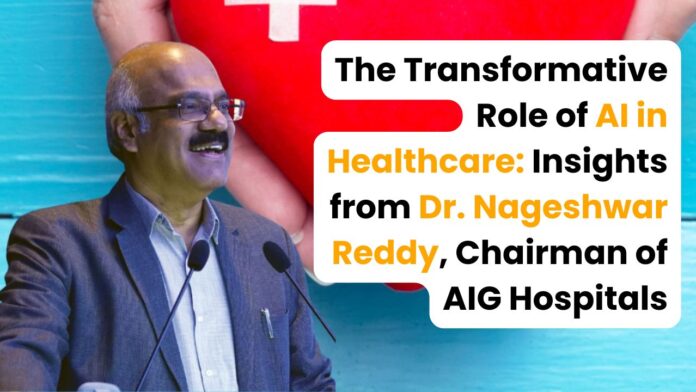At the recent International Startup Festival (ISF), Dr. Nageshwar Reddy, Chairman of AIG Hospitals, delivered an insightful presentation on the significant impact of Artificial Intelligence (AI) in the field of healthcare. His discussion illuminated how AI is not only enhancing clinical decision-making and patient engagement but also revolutionizing healthcare delivery as a whole.
AI in Clinical Practice: Enhancing Decision-Making and Diagnosis
Dr. Reddy opened by addressing the concerns many clinicians have regarding AI potentially replacing their roles. He reassured the audience that AI will not replace doctors but will empower those who are adept at utilizing AI tools. In the near future, an AI-empowered doctor will likely outperform a conventional doctor who is unfamiliar with these technologies.
He elaborated on four key areas where AI is making strides in healthcare: health services management, predictive medicine, patient data analysis, and clinical decision-making. For instance, in health services management, Dr. Reddy shared a success story from a hospital where AI helped streamline pre-operative checkups. By consolidating multiple tests into a single session, patient dropout rates for surgeries decreased from 20-30% to an impressive 99%.
Transforming Imaging and Diagnostics
The presentation underscored AI’s potential to enhance diagnostic accuracy. Dr. Reddy provided an example of how AI can analyze imaging data more effectively than human radiologists. In one case, a patient with pancreatic cancer had missed diagnoses over three years, but an AI review of past scans could have detected the cancer earlier. This capability could save lives and improve treatment outcomes, illustrating the importance of adopting AI technologies in medical practice.
Furthermore, AI is becoming integral to mobile health technologies. Devices like smartwatches can monitor vital signs and detect irregularities in real-time, allowing for immediate feedback and proactive health management. Dr. Reddy highlighted how AI can provide lifestyle recommendations based on data collected from patients, paving the way for better preventive care.
The Role of AI in Patient Engagement
Patient engagement is another area where AI is making a significant impact. Dr. Reddy discussed the development of an AI assistant, the Mira bot, which can answer patient questions with high satisfaction levels. This innovation allows busy doctors to focus on critical cases while ensuring patients receive timely information.
Interestingly, Dr. Reddy pointed out a recent study indicating that AI systems can exhibit greater empathy than some human doctors in patient interactions. This finding challenges the notion that technology lacks the emotional intelligence necessary for effective patient care and suggests that AI could enhance the patient experience by providing consistent, attentive responses.
Challenges and Ethical Considerations
Despite the promising advancements, Dr. Reddy acknowledged several challenges associated with AI integration in healthcare. Issues of data accuracy, ethical concerns, and regulatory frameworks are crucial considerations that need to be addressed. For instance, he raised questions about accountability when AI systems make errors, emphasizing the need for clear guidelines regarding liability.
Dr. Reddy recounted a real-world scenario in the U.S. where an AI-assisted colonoscopy failed to detect a polyp, leading to legal complexities regarding responsibility. Such dilemmas highlight the necessity for robust regulatory frameworks to govern AI’s role in medicine.
The Economic Potential and Future of AI in Healthcare
The economic implications of AI in healthcare are immense. Dr. Reddy projected that big data analytics could yield $300 to $450 billion in the U.S. alone, underscoring the financial benefits that come with improved efficiency and reduced hospital visits. However, he cautioned that the transition to AI-enhanced healthcare requires adaptation from medical professionals.
Dr. Reddy emphasized that the vast amounts of health data available in India represent a significant opportunity for leveraging AI. By integrating this data into AI systems, healthcare in India could undergo transformative changes, improving outcomes and accessibility.
Embracing the Future of Medicine
In conclusion, Dr. Nageshwar Reddy’s presentation paints an optimistic picture of AI’s role in the future of healthcare. By harnessing AI technologies, clinicians can enhance diagnostic accuracy, streamline operations, and improve patient engagement. The healthcare landscape is poised for significant transformation, and adapting to these changes will be essential for medical professionals to thrive.
As Dr. Reddy aptly stated, the 21st century is set to be defined by artificial intelligence. The call to action is clear: healthcare professionals must embrace this technology, not just to remain relevant, but to provide the best possible care in an increasingly complex medical landscape. The future of medicine is here, and it is powered by AI.




